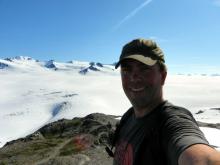Update
Archived PolarConnect Events
Nick and Amanda held two successful events – one or teachers, and one for students and the public. The events are available in the PolarConnect Archives.
What Are They Doing?

For example, In the Alaskan Arctic, wolf spiders are the largest and most abundant invertebrate predators. A shift in their ecological role could therefore have an important impact on the entire food web. Evidence from Arctic Greenland shows that wolf spider body sizes are becoming larger in response to longer growing seasons. These increases in body size will likely lead to larger spider populations, which could imply an increase in predation on the rest of the community.
This project explored the role of wolf spiders within arctic communities and specifically, whether climate change is stimulating changes in these predators that could influence the structure and functions of arctic food webs. The research team used a variety of methods to examine the impact of wolf spiders, including sampling spiders from various locations around Toolik Lake and carrying out a manipulative experiment that looked at the entire food web.
Where Are They?

Latest Journals

Amanda Koltz is a PhD candidate in ecology at Duke University under Dr. Justin Wright. Her research focuses on the relationship between community and ecosystem ecology (e.g. how species interactions can affect key ecosystem processes like decomposition and nutrient cycling). For her dissertation research, she is exploring how climate-induced changes in predatory spiders are influencing the structure and function of food webs in the Arctic. You can learn more about Amanda's research here.





